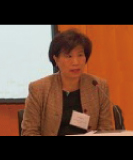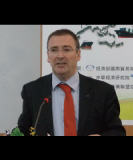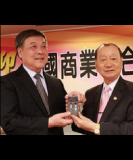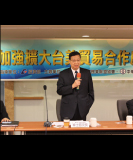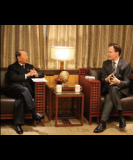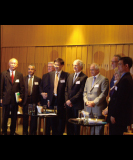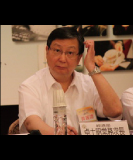You are browsing > Service in Taiwan > Development
DDG Wolff: “WTO reform is both necessary and feasible”WTO
Speaking at the “1+6” roundtable meeting presided by Chinese Premier Li Keqiang on 24 November, Deputy Director-General Alan Wolff urged WTO members to begin serious engagement on improving the WTO, arguing there was enough common ground to reach major new agreements. He also called on China to participate actively and contribute positively to planning far-reaching WTO reforms. In a separate press statement, DDG Wolff said all WTO members should contribute to improving the WTO, but that the largest trading nations have greater capacity to influence outcomes.
Press statement
The “1+6” roundtable is an annual gathering of leaders of six major international institutions (WTO, World Bank, International Monetary Fund, International Labour Organisation, Organisation for Economic Cooperation and Development, and the Financial Stability Board) hosted by China to share views on the world economy and global economic governance.
DDG Wolff's full speech is provided below:
China is a world leader in Artificial Intelligence. What is needed for the WTO, however, is Human Intelligence. Fortunately, in this regard China is also rich in resources. I noted last year at this event that China has a large number of highly qualified WTO experts, both inside government and in think tanks, and that I was sure that they could contribute much of value.
The major challenges faced by the WTO are not susceptible to quantitative analysis where AI would be most useful. The problems are political and diplomatic and concern relations among sovereign nations. They are the kinds of problems that you, Premier, and other countries' leaders are chosen for your ability to solve. This is true for the leaders of all 164 WTO Members.
I said last year that all WTO Members, regardless of size, have a valuable contribution to make and that they should be listened to. But it is also true that those who are the largest trading nations have greater capacity to analyse, to propose, to influence outcomes. Because of its capacity, because of its position in the world, China has the ability to play a major role in the shaping of world trade and the world trading system. There are many challenges that require its participation.
President Xi is pledged to multilateralism, as are all the G20 Leaders. They have repeatedly cited the need for WTO reform, as recently as two days ago(1), but the response has not met expectations.
It is no secret that the Members of the WTO have not been able to find far-reaching solutions through negotiations in recent years. The legislative, that is negotiating function of the WTO, is largely dormant. The fact that the WTO dispute settlement is not functioning as intended is well-known. Less well-known are the defects in the WTO's governance structure. The WTO has no executive arm. The Secretariat does not perform all of the analyses that would enable more effective administration of the world trading system. It initiates no proposals.
The WTO is a strictly Member-driven organization. That could give its strength but there is also the danger of weakness, where any decision, regardless of its importance, may be deemed to require unanimity. There has been too little positive engagement among the major Members. No senior official, in any government examining this issue, would fail to see the deficiencies that exist.
Every government of every WTO Member that has the capacity to do so must now consider how to improve on the WTO. The response to the pandemic by the Secretariat and Members in terms of providing information to increase transparency has been strong. However, to date, the substantive collective response, in terms of determining what measures are needed to spur trade and to curb trade restrictions, has been absent. Similarly, with respect to another crisis, namely climate change, while the Paris Accord has been in effect for some time now, the trade aspects of addressing this challenge have not been met with any updating of the world's trading rules. While the WTO remains highly relevant to the operation of the global economy, with over 80% of world trade conducted under its terms, the institution is sadly out of date with respect to having rules fit for the modern digital economy. Fortunately, this last subject is being addressed in a joint initiative on e-commerce in which China and a broad coalition of trading nations are participating.
There are some additional indications that the trading system may prove more responsive to current demands. This extends beyond the joint initiatives. China is to be congratulated along with Fiji, for beginning the discussion of solving the problems of plastics pollution, a discussion now joined in by an increasing number of other Members. China is also a reliable supporter of the WTO accessions process. In another activity of great importance to a number of least developed countries, it is highly active in cotton development assistance, the subject of the Consultative Forum at the WTO that I chair.
I urge China to be more active on a broader range of problems. As a country that has experienced spectacular growth since it joined the WTO nearly two decades ago, and has become the world's largest exporting nation, it has experienced first-hand the benefits of the multilateral trading system. Now that system needs its help.
The four largest WTO Members — the Members of the European Union, the United States, China and Japan account for over half of world trade. If they were to find common ground, it is highly likely that others would agree as well.
What would prevent this? It would be argued that the largest countries have serious differences. UN Secretary General Guterres has pointed to what he sees as the danger of a “great fracture”. One of the fault lines that he cites is the result of geostrategic tensions. It is said by some trade policy experts that this fault line runs through the WTO.
Divisions are far from new in the worlds of geopolitics and trade. There have been instances of this for thousands of years of human history. But is there no common ground now when it is needed? There are in fact, clearly areas where interests match rather than conflict. Three examples come readily to mind: One is making sure that trade facilitates and does not impede essential goods and services to combat the pandemic. A second is to use all available means in trade policy to spur a global economic recovery. A third is to have trade play its part in dealing with climate change.
Other subjects may prove more difficult but will not prove to be intractable with good will and effort. For disciplining fisheries subsidies or limiting the trade distorting use of domestic support for agriculture, China, along with other major trading nations, are essential to any viable solution. The major beneficiaries of effective action in these fields will be the least developed countries. They should hold all the major trading countries accountable for failing to improve the world trading system.
I believe that substantively there is enough common ground to be found to reach major new trade agreements that would improve the outlook for all nations.
I believe that fundamental WTO reform is both necessary and feasible.
The e-commerce negotiations must result in a deep and broad international agreement that creates predictability and shared rules essential to foster continuing growth of the global economy.
The Information Technology Agreement should be updated and should include medical equipment necessary to deal with the pandemic.
The Environmental Goods Agreement negotiations should be revived and an agreement concluded promptly, with the inclusion of services, to be part of the multilateral response to climate change.
The Pharmaceutical Agreement, providing for duty-free treatment should be updated in its coverage and China and other major producers should join as signatories. Medical supplies should be added to the agreement.
These are only some of the most obvious candidates for immediate action. The Chinese government is experienced in planning. It should participate actively and contribute positively to planning far-reaching WTO reforms, to be supported and adopted by all WTO Members.
Notes:
We “reaffirm the objectives and foundational principles of the multilateral trading system as well as to demonstrate our ongoing political support for the necessary reform of the WTO”… . G20 Leaders Declaration, 22 November 2020.

